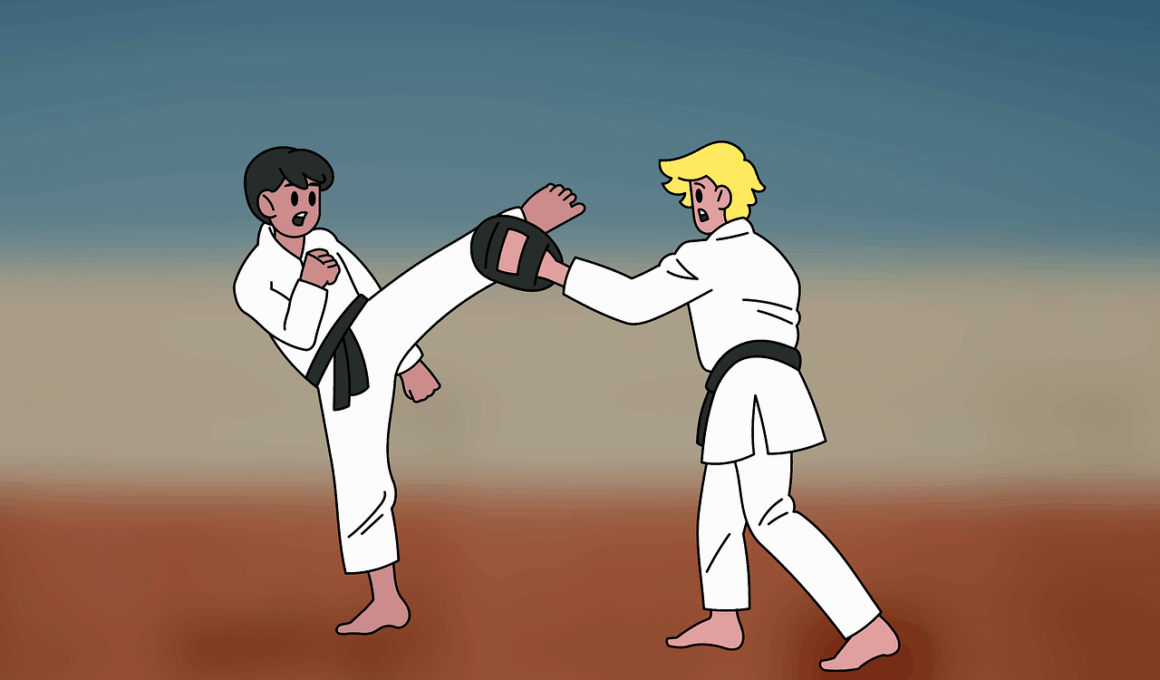Using Mindfulness Techniques in Martial Arts
Integrating mindfulness into martial arts training can transform sparring sessions fundamentally. Practitioners often focus on physical prowess, such as strength, speed, and technique. However, incorporating mindfulness encourages heightened awareness, self-reflection, and present-moment focus. This mental state significantly enhances performance by allowing martial artists to connect with their movements, breathing, and strategies in real-time. Mindful sparring involves observing thoughts and emotions without judgment, enabling better control over reactions. In doing so, practitioners may notice improving techniques as well as emotional responses during intense exchanges. Recognizing triggers, such as frustration or anxiety, is crucial in silencing the mind’s distractions. Additionally, focused breathing serves as a cornerstone of mindfulness practice within martial arts. Implementing deep, conscious breaths can calm the nervous system, allowing the sparring partner to maintain composure through pressure. Overall, cultivating mindfulness prepares martial artists to respond rather than react, leading to a more fulfilling sparring experience. So, by being present and attentive, they not only refine their skills but also foster mental resilience. The fusion of mindfulness with martial arts can yield immeasurable benefits for all practitioners, from novices to seasoned professionals.
The Role of Controlled Breathing
Breathing plays a pivotal role in enhancing performance in martial arts sparring sessions. Proper breathing techniques promote not only mental clarity but also physical endurance. First, understanding how to manage breath helps maintain energy levels throughout extended sparring rounds. Controlled inhalation and exhalation can serve as a rhythm, helping maintain focus even during heightened stress. When faced with challenging sparring partners, remembering to breathe deeply can reduce panic and anxiety. It allows martial artists to regain composure and think strategically about their next moves. Furthermore, mindfulness encourages utilizing breath as an anchor to stay rooted in the moment. This practice eliminates distractions, centering attention on the immediate experience, which is critical during sparring. Practitioners can implement techniques such as the 4-7-8 breathing method to integrate breath control effectively. Inhale through the nose for four counts, hold for seven, and exhale through the mouth for eight. This exercise not only calms the mind but also revitalizes the body. Regular practice of such techniques fosters resilience, enabling martial artists to adapt and thrive during unpredictable sparring scenarios, ultimately strengthening their overall performance.
Visualizing Success in Sparring Scenarios
One immensely beneficial technique in martial arts is the power of visualization. Visualizing success in sparring scenarios allows athletes to create a mental blueprint of precise movements and strategies. By imagining themselves successfully executing techniques and gaining victory against a sparring partner, martial artists engage both their minds and bodies. This practice primes the subconscious for real-life application, making execution feel more natural. Visualization permits athletes to rehearse numerous outcomes, preparing for various situations they may encounter. As they mentally practice defensive and offensive maneuvers, they build confidence and enhance muscle memory, making reactions quicker during sparring. Furthermore, incorporating mindfulness into visualization practices raises awareness of mental blocks or fears. By identifying these hindrances, martial artists can work towards overcoming them through mindful practices. By fostering a clear, focused mindset, visualization encourages resilience. It also enhances emotional control, reducing instances of frustration or anxiety during actual sparring sessions. Overall, visualizing success paired with mindfulness fosters growth, empowers practitioners, and ultimately elevates their martial arts journey.
Building Emotional Resilience Through Mindfulness
Emotional resilience is critical in martial arts sparring, as practitioners often face adversity and challenges on the mat. Mindfulness training promotes emotional regulation, enabling martial artists to manage feelings of frustration, anger, or disappointment during sparring. When sparring, practitioners may experience various emotions, often exacerbated by competition and the physical nature of the activity. Developing resilience allows them to navigate these emotions effectively, preventing distractions that can impede performance. Engaging in mindful reflection before and after sparring sessions promotes self-awareness, aiding practitioners in understanding their emotional responses. It encourages honest evaluations of their performances, revealing areas for improvement. Furthermore, through meditation and mindfulness exercises, martial artists cultivate a non-reactive mindset, learning to process emotions without judgment. This prevents the escalation of negative feelings during practice sessions, promoting a healthier and more positive environment. Resilient practitioners are more likely to maintain focus and drive, benefiting not only their training but fostering camaraderie with fellow martial artists. By embedding mindfulness into training, the development of emotional resilience leads to more productive and enjoyable sparring experiences.
The Importance of Reflection in Training
Reflection is an integral component of mindfulness practice that significantly benefits martial artists during and after sparring sessions. After each training sequence or sparring match, setting aside time for honest self-reflection can illuminate strengths and weaknesses. Engaging in this practice enhances awareness of techniques employed, understanding personal limits, and recognizing areas needing improvement. Being mindful during reflection allows practitioners to assess their emotional states more clearly, providing insights into reacting patterns during sparring. Likewise, tools such as journaling can aid reflection efforts, allowing martial artists to track progress, feelings, and thoughts over time. This not only maintains motivation but also establishes a clear path for growth. Moreover, discussing experiences with coaching staff or peers reinforces learning, creating a supportive network for improvement. Through collective discussion, practitioners may glean tips and techniques from one another, enhancing their overall training outcomes. Reflection nurtures a growth mindset, making it easier to adapt to new circumstances or develop new strategies. By embedding reflection into martial arts training, practitioners can significantly enhance their sparring skills and overall performance.
Creating a Mindful Training Environment
Establishing a mindful training environment is essential for fostering the benefits of mindfulness in martial arts. The setup should promote focus, calmness, and respect, as these elements greatly enhance the practice. This involves creating a physically and mentally conducive atmosphere. First, ensuring the training space is clutter-free and organized helps reduce distractions, allowing practitioners to concentrate on their movements. Lighting levels should be moderate, preventing harsh brightness from causing discomfort during practice. Additionally, adopting a respectful attitude towards one another cultivates support among practitioners, fostering a sense of community. Strong communication between peers, which encourages openness, enhances trust. Engaging in warm-up practices that emphasize mindfulness can help set the tone for the session. Techniques such as guided meditation or breathing exercises can transition individuals’ minds into a focused state. Further, incorporating music or calming sounds can also aid in concentration. By establishing this environment, martial artists can better internalize the principles of mindfulness, making their training sessions more impactful. Overall, taking steps to create a mindful training space leads to long-lasting positive effects on performance during sparring and beyond.
Measuring Mindfulness Through Performance
Finally, measuring mindfulness through performance in martial arts sparring can yield significant insights into growth and improvement. Practitioners can set metrics to gauge their level of focus, composure, and emotional balance during training sessions. By observing their responses in various sparring situations, they can assess the effectiveness of mindfulness techniques employed. For instance, recording instances of distraction or emotional response during sparring can highlight areas for growth. Additionally, conducting performance reviews with coaching staff can help athletes understand their progress over time. Regularly reflecting on personal experiences allows practitioners to see tangible changes in their techniques and demeanor. Keeping track of improvements in skill levels, such as executing techniques with precision or navigating difficult exchanges, can significantly testify to the impact of integrating mindfulness. Furthermore, encouraging feedback from peers can enhance self-awareness, providing different perspectives on one’s practice. This evaluative process not only enhances martial artists’ meditation practice but also reinforces commitment and dedication. Thus, measuring performance with mindfulness reflects the deep changes arising from this transformative practice and showcases the journey of personal development.


